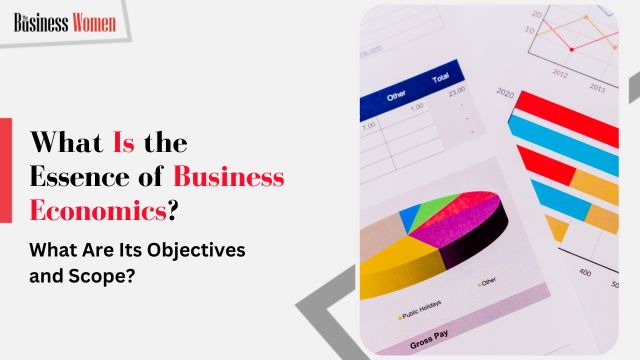Business economics, a specialised discipline, delves into the application of economic principles within the realm of business operations. Its primary mission is to dissect financial data to resolve business dilemmas and drive well-informed decision-making. This field plays a pivotal role in the delicate equilibrium of finite resources and boundless aspirations.
At its core, business economics concentrates on the anticipation of forthcoming trends and the formulation of strategies aimed at optimising profitability. Its purview encompasses an array of domains, including demand analysis and prognostication, cost evaluation and production procedures, pricing strategy determination, profit management, and the oversight of wealth distribution.
What is Business Economics?
Business economics, also known as managerial economics, explores the application and relevance of economic principles and concepts in the management of enterprises. It entails scrutinising economic models, methodologies, and philosophies to address tangible business challenges. The study of business economics is an amalgamation of art and science, offering multifaceted insights into organisational, financial, environmental, and market-oriented issues. These topics encompass elements such as the factors influencing production, the concept of scarcity, consumption patterns, and distribution dynamics.
One noteworthy facet of business economics is its intimate connection with normative economics. Put simply, economic theories serve as guiding lights in the tumultuous seas of business decision-making, aiding in problem resolution and providing profound insights into corporate governance. This encompasses areas such as demand analysis, profit maximisation, pricing strategies, competition dynamics, production methodologies, national income, and business cycles.
Scope of Business Economics
The scope of business economics can be elucidated through various disciplines:
Demand Analysis and Forecasting
This discipline aids organisations in planning production schedules and resource allocation with precision. It empowers leaders to sustain and enhance revenue streams and market positioning by comprehending the forces influencing product demand.
Cost and Production Analysis
Business economics involves the meticulous assessment of costs associated with diverse outputs and the identification of factors contributing to cost deviations. Managers leverage this analysis to ascertain optimal output levels that minimise costs, prevent wastage, and achieve desired profit margins. This process often incorporates the use of break-even analysis.
Costing Decisions and Strategies
Accurate costing decisions are pivotal for a company’s profitability. Pricing methodologies, market-driven price determinants, product line pricing, and differential pricing all fall within the purview of this discipline.
Wealth Management
Regulating and planning capital expenditures, often involving substantial resources, is integral to wealth management. The prudent management and disposal of capital assets necessitate meticulous deliberation and may entail significant time and effort. Effective management of current assets and liabilities is also a cornerstone of this discipline.
The scope of business economics serves as a compass for effective decision-making, reasonable resource allocation, and the maximisation of profitability within organisations.
Profit Management
To attain higher profits, managers must evaluate anticipated gains and formulate appropriate pricing strategies across various output levels. Mitigating uncertainty plays a pivotal role in revenue maximisation. Profits are complex concepts that demand a profound understanding of business economics.
Objectives of Business Economics
The objectives of business economics manifest through the following tenets:
Identification and Resolution of Business Problems
Managerial economics provides valuable concepts, including cost analysis, demand and supply dynamics, and the law of diminishing marginal utility, which empowers business managers to discern and resolve business quandaries effectively.
Designing Profitable Business Policies
Business economics centres around profit maximisation, which acts as a guiding principle in shaping various business policies, encompassing cost and pricing policies. These policies evolve from meticulous economic assessments and data.
Future Prediction
Through an exhaustive analysis of economic variables such as capital investment and production costs, business economics aids firms in predicting future trends. This empowers enterprises to anticipate and preempt unfavourable scenarios while harnessing available resources optimally.
Building Relationships Between Financial Aspects
Managerial economics facilitates the establishment of connections between diverse economic factors, including profits, income, market structure, and losses. This assists managers in making informed decisions and ensures the efficient administration of businesses.
The objectives of business economics constitute the pillars of effective decision-making, strategic planning, and overall business triumph.
Summary
- Business economics integrates economic theories for decision-making in business.
- It covers financial, market, environmental, and organisational aspects.
- It combines creative thinking with empirical analysis, blending art and science.
- Areas include demand analysis, forecasting, cost and production analysis, pricing strategies, profit management, and wealth management.
- Objectives involve predicting trends, addressing issues, crafting effective policies, and connecting economic factors.
Conclusion
In conclusion, the significance of business economics in organisational management and decision-making cannot be overstated. Through the fusion of economic theories with real-world business practices, it offers invaluable perspectives on comprehending and resolving intricate business challenges. By harnessing the methodologies and principles of business economics, organisations can effectively steer through the dynamic business environment and attain enduring success in a fiercely competitive market.
Answering Some of the Most Commonly Asked Questions
What is Business Economics?
Business economics refers to the application of economic theories to solve business problems and make informed decisions.
What is the Scope of Business Economics?
The scope of business economics encompasses various areas, including demand analysis, cost and production analysis, pricing strategies, profit management, and decision-making processes.
What Are the Advantages of Business Economics?
Business economics provides several advantages, including informed decision-making, the formulation of effective business policies, optimisation of resources, enhanced profitability, the ability to forecast future trends, identification and resolution of issues, and a comprehensive understanding of financial aspects.
Why Study Business Economics?
Studying business economics is essential for gaining insights into how economic principles can be applied in the business world. It enables individuals and organisations to make rational decisions, improve business performance, and gain a competitive edge in the marketplace.








